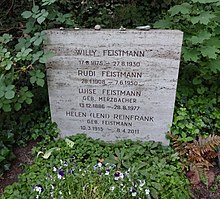Rudolf Feistmann
Rudolf Feistmann , also Rudolf Fürth , (born January 28, 1908 in Fürth ; † June 7, 1950 in Berlin ) was a German journalist .
Life
Rudolf Feistmann was the son of a Jewish timber merchant. After leaving school, he studied in Berlin Law and was a member of the German Communist Party (KPD), for which he also worked as a journalist.
In March 1933 Feistmann emigrated to France, where he became editor-in-chief of the KPD newspaper Our Time and worked on the publication of the Brown Book on the Reichstag fire . After the outbreak of the Second World War he was interned in France, fled to Mexico in 1941 , where he called himself Rudolf Fürth . He became secretary of the Heinrich Heine Club , a member of the Free Germany Movement in Mexico , and in 1942/43 he worked as an editor for the magazine Free Germany and later for the Democratic Post . During these years he was in a relationship with the Swiss journalist and socialist Gertrud Düby .
In 1947 Rudolf Feistmann returned to Germany and joined the Socialist Unity Party of Germany (SED). He worked in the editor-in-chief of New Germany (ND) and was responsible for the foreign policy department.
Feistmann belonged to the circle of friends around Paul Merker and Otto Katz , who, like him, had been in exile in Mexico. Merker and Katz, who were Jews like Feistmann, were also indicted for their connection to the US diplomat and communist Noel Field , who was accused of espionage in Hungary in 1949 , and as part of a wave of Stalinist purges. Katz was sentenced to death and executed in the Slansky trial in 1952, while Merker was sentenced to eight years in prison in 1955 as a "Zionist agent".
In May 1950 Feistmann was also arrested and interrogated because of his “Jewish origin”, “family ties extending to the West”, his trips as ND representative to London and Prague and a confidante of Merker. In April 1948 he had attended Egon Erwin Kisch's funeral in Prague and had taken letters with him to Berlin for friends; now he was accused of including letters from Field. He was released home on condition that he hand over his private correspondence and write a report on his biography and "possible violations of the principles of communist politics." Feistmann was found dead in his apartment on June 7th.
In New Germany at that time "meat poisoning" was given as the cause of death. The West German magazine Der Spiegel wrote in 1953 about a “strange meat poisoning after Ulbricht & Co. discovered that his old mother lived in Washington DC and traded soap”. The historian Martin Jander stated in 2010: "It was obvious that Rudolf Feistmann had killed himself out of desperation that his comrades suspected him and pushed him out of their midst." In mid-April 1950, party comrade Paul Bertz had already followed Received a subpoena to the Central Party Control Commission for similar allegations of field suicide.
Publications
- The SPD apparatus. 300,000 items to be awarded . With an afterword by Kurt Sauerland . Publishing house of the Central Committee of the IAH, Berlin 1929 (supplements to "Red Structure" 2)
- El libro negro del terror nazi en Europe. Testimonios de escritores y artistas de 16 naciones . Mexico 1943
- Criminales de guerra . Mexico 1945
literature
- Martin Jander: “'The hearts of our comrades are apparently even harder than stone.' Two unexplained deaths: Willi Kreikemeyer and Rudolf Feistmann ”. In: “We didn't have that.” Anti-Semitism in the GDR. The book for the exhibition of the Amadeu Antonio Foundation . Berlin 2010. pp. 44–52
- Feistmann, Rudolf. In: Lexicon of German-Jewish Authors . Volume 7: Feis – Frey. Edited by the Bibliographia Judaica archive. Saur, Munich 1999, ISBN 3-598-22687-X , pp. 16-18.
- Hermann Weber , Andreas Herbst : German communists. Biographical Handbook 1918 to 1945 . 2nd, revised and greatly expanded edition. Dietz, Berlin 2008, ISBN 978-3-320-02130-6 ( online [accessed January 2, 2012]).
Individual evidence
- ↑ The magazine "Free Germany" on uni-potsdam.de ( Memento from March 19, 2011 in the Internet Archive )
- ↑ Encounter with the Lacandons on latein Amerika-nachrichten.de
- ↑ a b Jander, p. 47
- ^ New Germany, June 8, 1950
- ↑ The gods thirst on spiegel.de v. January 21, 1953
- ↑ Udo Grashof: Taboo or prophylaxis? The suicide rates in the GDR and the politics of the SED. In: Andreas Bähr, Hans Medick (ed.): Dying by one's own hand: suicide as a cultural practice. Böhlau Verlag Köln Weimar, 2005, p. 195
| personal data | |
|---|---|
| SURNAME | Feistmann, Rudolf |
| ALTERNATIVE NAMES | Fürth, Rudolf |
| BRIEF DESCRIPTION | German journalist |
| DATE OF BIRTH | January 28, 1908 |
| PLACE OF BIRTH | Fuerth |
| DATE OF DEATH | June 7, 1950 |
| Place of death | Berlin |
